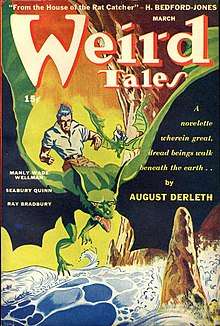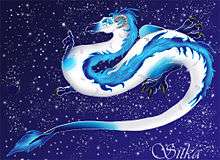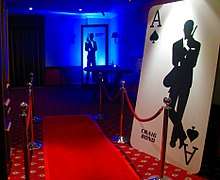
Fantasies are things that can't happen, and science fiction is about things that can happen. ~ Ray Bradbury

The poet is in command of his fantasy, while it is exactly the mark of the neurotic that he is possessed by his fantasy. ~ Lionel Trilling

People buy a ticket. That ticket is their transport to a fantasy which you create for them. Fantasyland, that’s all, and you make their fantasies live. Fantasies of love or hatred or whatever it is. People want their fantasies over and over. People who masturbate usually masturbate with, at the most, four or five fantasies. By and large. Most people like the same food and they like the same kind of music, they like the same kind of sexual fantasy for a period of time, then maybe it changes. As it is in children. Who is it? Bruce Lee. That’s the hero. Then you grow up and grow out of your Bruce Lee period, or your Picasso Blue Period, and go into another period. ~ Marlon Brando
.jpg)
In the fantasies they committed to paper, the men associated the women they despised with floods of liquid and slime, and with dirt – substances that would threaten to overwhelm the defences of their ill-formed psyches. The solider male felt that he could only guarantee “his own survival, his self-preservation and self-regeneration”, through acts of violence against such women. ~ Jason Wilson

Harmless erotic fantasies are terrific, it’s the lousy ones you have to look out for—the harmful, destructive, morbid erotic fixations—real sadism, killing, blood-letting, torturing where the pleasure is in the victim’s actual pain, etc. Those are 100 per cent bad and I won’t have any part of them. ~ William Moulton Marston

Fantasy service [extras] for the male readers, men are hen-pecked by their wives and their are wages are increasingly equal to women's so they like the rape scenes as they restore their sense of power. ~ Toshio Maeda
.jpg)
It is said that science fiction and fantasy are two different things. Science fiction is the improbable made possible, and fantasy is the impossible made probable. ~ Rod Serling
Fantasy refers to constructs of the imagination; in storytelling fantasy generally refers to a genre that uses magic and other supernatural forms as a primary element of plot, theme, and/or setting. It is is generally distinguished from science fiction by the expectation that scientific laws are not inherently assumed to be like those of reality, though the two genres can overlap and are both sub genres of speculative fiction.
Quotes
- All fantasy should have a solid base in reality.
- Sir Max Beerbohm, in Zuleika Dobson (1911).
- Fantasies are things that can't happen, and science fiction is about things that can happen.
- But films . . . it’s funny. People buy a ticket. That ticket is their transport to a fantasy which you create for them. Fantasyland, that’s all, and you make their fantasies live. Fantasies of love or hatred or whatever it is. People want their fantasies over and over. People who masturbate usually masturbate with, at the most, four or five fantasies. By and large. Most people like the same food and they like the same kind of music, they like the same kind of sexual fantasy for a period of time, then maybe it changes. As it is in children. Who is it? Bruce Lee. That’s the hero. Then you grow up and grow out of your Bruce Lee period, or your Picasso Blue Period, and go into another period.
“But with kids, because they outpower us, because they have no representation, because they are so dependent, all they think about is power. Dinosaurs or the Million Dollar Man, because they feel so helpless, because they have no way out of it, except fantasy. Because they are only that tall.
“And that’s all films are. Just an extension of childhood, where everybody wants to be freer, everybody wants to be powerful, everybody wants to be so overwhelmingly attractive that there’s just no doing anything about it. Or everybody wants to have comradeship and to be understood.- Marlon Brando in “Mondo Brando: The Method of His Madness”, by Chris Hodenfield, Rolling Stone, (May 20, 1976).
- Your true adult, with fully-developed mind can enjoy fantasy whole-heartedly if it's written in adult words and thought-forms, because, being absolutely confident of his own mental capacity, he doesn't have any sense of embarrassment at being caught reading "childish stuff"....And every human being likes fantasy fundamentally. All we need is fantasy expressed in truly adult forms. Every author who honestly and lovingly does that makes a name on it. Lord Dunsany, Washington Irving, Stephen Vincent Benét.
- John W. Campbell, Letter to L. Ron Hubbard discussing Campbell's new fantasy magazine Unknown. January 23, 1939. Quoted in The John W. Campbell Letters, Volume 1 (1986) p. 15.
- Do not confuse fantasy with imagination: the former consumes itself in daydreaming, the latter stimulates creativity in the arts and in the sciences.
- Fausto Cercignani in: Brian Morris, Simply Transcribed. Quotations from Fausto Cercignani (2014), p. 29.
- A long time ago, in a conference room far, far away... it was ordained that sword-and-sorcery movies would be the Next Big Thing. Just imagine crossing the fantasy worlds of JRR Tolkien and George Lucas! Mythic reverberations! Megabucks! Didn't work.
- Richard Corlis; as quoted in Looking back at Ridley Scotts Legend, by Michael Leader, Den of Geek, (Feb 29, 2012).
- "There, Master Niketas," Baudolino said, "when I was not prey to the temptations of this world, I devoted my nights to imagining other worlds. ... There is nothing better than imagining other worlds," he said, "to forget the painful one we live in. At least so I thought then. I hadn't yet realized that, imagining other worlds, you end up changing this one."
- Umberto Eco, Baudolino (2000), p. 99.
- Thus, modern pleasure seeking according to Campbell is no longer related to the senses but to activities like daydreaming or fantasizing. The purpose of goods in this context is to act as props. They are the building blocs around which consumers create their pleasurable visions.
- Andreas B. Eisingerich, Gunjan Bhardwaj, Yoshio Miyamoto, Jackson Dykman, "Coming to live in a consumer society", (April 2010).
- Well, I really want to encourage a kind of fantasy, a kind of magic. I love the term magic realism, whoever invented it — I do actually like it because it says certain things. It's about expanding how you see the world. I think we live in an age where we're just hammered, hammered to think this is what the world is. Television's saying, everything's saying "That's the world." And it's not the world. The world is a million possible things.
- Terry Gilliam as quoted in "Salman Rushdie talks with Terry Gilliam", in The Believer (March 2003).
- My fantasy since I was a small child was to dominate a dominating man. That turns me on more than anything, a man who does not want to be dominated—like Sean Connery, a really macho man. The kind of man who has no desire for submission. It’s truly perverse. It’s the power play: who has it, how long you have it for, and what you do with it.
- Catherine Robbe-Grillet as quoted by Toni Bentley in "Catherine Robbe Grillet French Dominatrix" Vanity Fair, (02/2014)
- The Onion: How did your interest in fantasy first develop?
- Jean-Pierre Jeunet: Actually, it comes very naturally for me, because all day my mind drifts off into fantasies and little stupid jokes. For example, when Amelie looks out at the city and wonders how many people are screwing at that moment. I have those same kind of ridiculous questions all the time. [Holds up glass of water, points at the skyline.] Like now, how many people in this city are bringing a glass of water to their mouths? It's always been pretty easy for me to exercise my imagination. The other part of the brain, the one that does mathematics, is a nightmare for me. It doesn't work at all. When I was a kid, I used to escape from my family with my imagination, and I kept this spirit into my adult life. This doesn't always happen. All children have imagination, but for some it doesn't carry over.
- Jean-pierre Jeunet, "Jean-Pierre Jeunet" by Scott Tobias, A.V. Club, (10/31/01).
- The Onion: How did you develop your particular visual style?
- Jean-Pierre Jeunet: Well, it came to me naturally, too. In literature, we think about and accept the fantastical style all the time, but in film, that's not always the case, especially in France. Sometimes they hate the style. They prefer ugly things, realistic movies. I love to play with everything: the sound, the costumes, the camera.
- Jean-pierre Jeunet, "Jean-Pierre Jeunet" by Scott Tobias, A.V. Club, (10/31/01).
- "This sort of fiction, commonly called "sword and sorcery" by its fans, is not fantasy at its lowest, but it still has a pretty tacky feel; mostly it's the Hardy Boys dressed up in animal skins and rated R ( and with cover art by Jeff Jones, as likely as not). Sword and sorcery novels and stories are tales of power for the powerless. The fellow who is afraid of being rousted by those young punks who hang around his bus stop can go home at night and imagine himself wielding a sword, his potbelly miraculously gone, his slack muscles magically transmuted into those "iron thews" which have been sung and storied in the pulps for the last fifty years.
- Stephen King, Danse Macabre, p. 204, ISBN 978-1439170984
- It [fantasy literature] is accused of giving children a false impression of the world they live in. But I think no literature that children could read gives them less of a false impression. I think what profess to be realistic stories for children are far more likely to deceive them.
- C. S. Lewis, "On Three Ways of Writing for Children" (1952)
- Maeda Toshio suggests that aside the theme of human selfishness, the hard-core rape and tentacle porn with which this manga and animation have become synonymous, are "Fantasy service [extras] for the male readers, men are hen-pecked by their wives and their are wages are increasingly equal to women's so they like the rape scenes as they restore their sense of power."
- Toshio Maeda interview, Sagamihara, (18 October 2012); as quoted in Schoolgirls, Money and Rebellion in Japan by Sharon Kinsella, p.162.
- Harmless erotic fantasies are terrific, it’s the lousy ones you have to look out for—the harmful, destructive, morbid erotic fixations—real sadism, killing, blood-letting, torturing where the pleasure is in the victim’s actual pain, etc. Those are 100 per cent bad and I won’t have any part of them.
- William Moulton Marston, letter to Max Gaines, (1943), as quoted in "The Surprising Origin Story of Wonder Woman", Jill Lepore, Smithsonian Magazine, (October 2014).
- John Bell: What attracted you initially to heroic fantasy, a subgenre of fantastic literature that was once notorious for its less-than-enlightened racial attitude?
- Charles R. Saunders: As a reader, I was attracted to the action, the mayhem, the exotic settings, and the sheet imaginary power of the genre. Also, I was fascinated by the kinship between heroic fantasy and the ancient myth-cycles that were the world's first literature. The legend of Beowulf, for example, could easily have been marketed today as heroic fantasy. As for the unenlightened racial attitudes, I must admit that when I first encountered the genre, in the early 1960s, I did not pay very much attention to the racial content of the stories I read. It was only when I became deeply absorbed in the study of African history and culture that I took a second look at the fantasy I had been reading, and at that point I began to seriously question the racial content of some of it.
- Charles R. Saunders in “A Charles R. Saunders Interview”, by John Bell, Black American Literature Forum, Vol. 18, No. 2, Science Fiction Issue (Summer, 1984), p. 90
- It is said that science fiction and fantasy are two different things. Science fiction is the improbable made possible, and fantasy is the impossible made probable.
- Rod Serling The Twilight Zone, "The Fugitive" (1962)
- Fantasy literature, in its broadest definition from "Cinderella" to "Beowulf" to Stephen Donaldson, is literature which makes deliberate use of something known to be impossible.
- Tom Shippey, in "Introduction" to The Oxford Book of Fantasy Stories (1994).
- Fantasy is a higher form of Art, indeed the most nearly pure form, and so (when achieved) the most potent.
- Fantasy remains a human right: we make in our measure and in our derivative mode, because we are made: and not only made, but made in the image and likeness of a Maker.
- I have claimed that Escape is one of the main functions of fairy-stories, and since I do not disapprove of them, it is plain that I do not accept the tone of scorn or pity with which 'Escape' is now so often used. Why should a man be scorned if, finding himself in prison, he tries to get out and go home? Or if he cannot do so, he thinks and talks about other topics than jailers and prison-walls? The world outside has not become less real because the prisoner cannot see it.
- J. R. R. Tolkien, On Fairy-Stories, (originally given as an Andrew Lang Lecture at the University of St. Andrews on 8 March 1939, and published in Essays presented to Charles Williams in 1947 (1939).
- The poet is in command of his fantasy, while it is exactly the mark of the neurotic that he is possessed by his fantasy.
- Lionel Trilling, in The Liberal Imagination (1950).
- The "hard" science-fiction writers are the ones who try to write specific stories about all that technology may do for us. More and more, these writers felt an opaque wall across the future. Once, they could put such fantasies millions of years in the future. Now they saw that their most diligent extrapolations resulted in the unknowable … soon.
- Vernor Vinge, "The Coming Technological Singularity" (1993).
- It is easy to imagine fantasy as physical and myth as real. We do it almost every moment. We do this as we dream, as we think, and as we cope with the world about us. But these worlds of fantasy that we form into the solid things around us are the source of our discontent. They inspire our search to find ourselves.
- Evan Harris Walker, in The Physics of Consciousness : The Quantum Mind and the Meaning of Life (2000).
- Our writers, I believe, discern a resemblance between the world and their books. Through fantasy, they are saying something about life which could not be said within the naturalistic frame of reference.
- Edward Wagenknecht, ""The Little Prince Rides the White Deer: Fantasy and Symbolism in Recent Literature", College English, (May 1946).
- In 1977, Klaus Theweleit published a book in which he sought to understand the germination of fascism in interwar Germany. His method was to study the fantasy life of that era’s conservative revolutionaries, by reading the diaries, novels and letters of the men who joined the Freikorps militias, and fought against insurgent communists during the early days of the Weimar Republic.
- Jason Wilson, "What do incels, fascists and terrorists have in common? Violent misogyny", The Guardian, (4, May 2018).
- In the fantasies they committed to paper, the men associated the women they despised with floods of liquid and slime, and with dirt – substances that would threaten to overwhelm the defences of their ill-formed psyches.
- Jason Wilson, "What do incels, fascists and terrorists have in common? Violent misogyny", The Guardian, (4, May 2018).
See also
External links
This article is issued from
Wikiquote.
The text is licensed under Creative
Commons - Attribution - Sharealike.
Additional terms may apply for the media files.